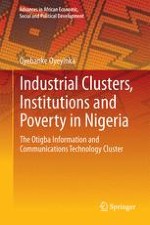This book provides a systematic examination of the relationship between industrial clusters and poverty, which is analyzed using a multidimensional framework. It examines the often-neglected concept of social protection as a means of mitigating the risks and vulnerabilities faced by workers and citizens in poor countries. By analyzing the case of the Otigba Information and Communications Technology cluster in Lagos, Nigeria, the author shows under which conditions firms in productive clusters can pass on benefits to workers in ways that improve their living standards in the wider socio-economic and spatial context of the region. The results presented provide substantial evidence of opportunities for economic development, helping planners to explore different avenues for integrating firm-driven social protection into social policy.
